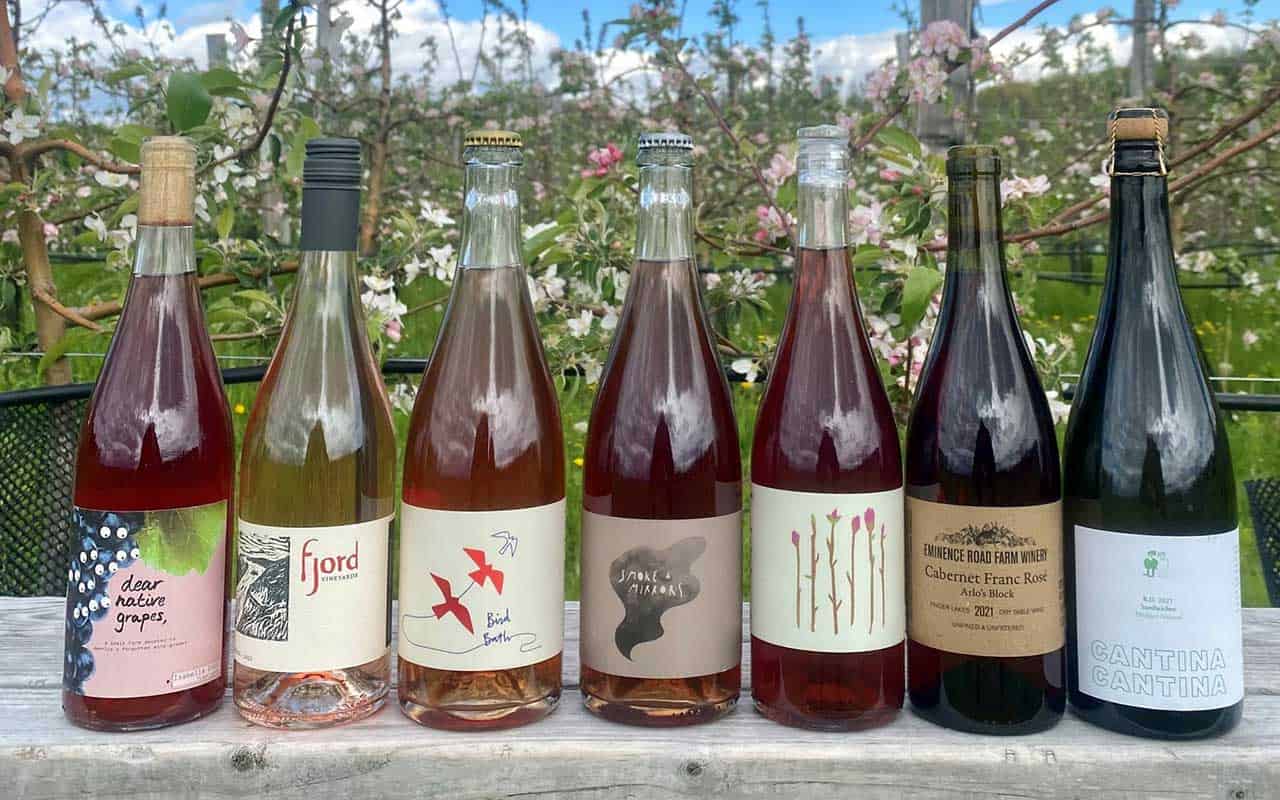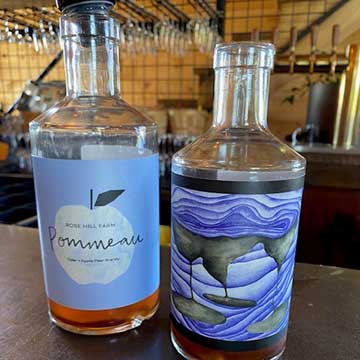This Month’s Featured Article

The Many Lives of Rose Hill Farm
 It was one of those days when everything sparkles. A sunny day without a cloud in the sky, temps in the upper 70s, and no humidity. A day to fall in love and be in love, and the perfect place to do it: Rose Hill Farm in Red Hook in Dutchess County.
It was one of those days when everything sparkles. A sunny day without a cloud in the sky, temps in the upper 70s, and no humidity. A day to fall in love and be in love, and the perfect place to do it: Rose Hill Farm in Red Hook in Dutchess County.
Rose Hill isn’t just one of the newest craft beverage producers in the Hudson Valley (though it is that), it’s a farm with roots dating back over 200 years. It’s where old meets new, where the practices of the past are merging with those of the present with an eye on the future, where a passion for what’s possible permeates everything.
A bicentennial family farm
Peter Fraleigh purchased the 114 acres that would become Rose Hill Farm in 1798, and the farm was formally established in 1812. Six generations of Fraleighs have farmed the land, which was primarily orchards but has also included livestock and chickens through the years – over 200 years! In 2001, Rose Hill was honored as the only fruit orchard among 10 bicentennial family farms by the NY State Agricultural Society.
When you exit Route 9 and turn off Fraleigh Lane onto Rose Hill Farm, you step back in time. The driveway is lined with ancient maple trees that likely date to the farm’s founding, and the large farmhouse is still standing. It’s easy to imagine the Fraleigh family living here through generations as their orchards and home expanded around them. Historians have dated an expansion from a small home to what is considered a center hall colonial in the 1800s. Some of the interior wood flooring planks are 18-inch-wide old-growth pine.
Dave and Karen Fraleigh transitioned Rose Hill from a wholesale apple orchard to a pick-your-own farm in the late 1990s and expanded the orchards to include peach, nectarine, apricot, and cherry trees, as well as blueberries, raspberries, pumpkins, and winter squash. The U-pick was a local favorite, but when it came time for the next generation to take over, the Fraleighs recognized that their children had other interests. Rose Hill Farm came on the market.
Enter the Brittains
Bruce and Holly Brittain started escaping to the Hudson Valley and Catskill region from New York City when they were dating. They discovered Rose Hill Farm in 2011 when they were looking for what Holly describes as an “off-the-beaten-path farm” where they could pick apples. In 2013, they married at The Hill at Bell’s Bond in Livingston. Some roots were being laid down.
“For our first anniversary in June 2014, we returned to The Hill for a picnic,” Holly recalls. An architect by trade, Holly continues, “Around that time, one of my projects hit some unexpected obstacles, so we sold it and decided to contribute the proceeds towards a project upstate. On our second wedding anniversary, we returned to Rose Hill Farm in the pouring rain to sit down with the Fraleighs and see if the farm could be the next project.”
With a new baby and a new dream, Bruce and Holly closed on Rose Hill Farm in late 2015. A couple of months later, Bruce’s uncle, Chris Belardi, joined the team. The impetus? “Rose Hill Farm has beautiful landscapes and amazing views to the west of the great blue Catskill Mountains beyond the Hudson River,” Chris notes, “but it is in the dark of the night, when the silence is broken only by crickets, bullfrogs, nightingales, and the occasional vehicle passing on Route 9 that I feel most at peace on the farm.” He was in.
Over 100 acres of farmland was theirs. Local expectations of the continuation of Rose Hill as a family-friendly U-pick farm were entrenched. Bruce, Holly, and Chris were undaunted. Holly’s experiences with re-development and architecture guided her, and they had a sound financial plan. “The three of us share a love of the outdoors, an entrepreneurial spirit, and a passion for building,” Holly says. Farming experience? Nope, though Bruce’s great-grandfather was the dean of agriculture at McGill University, where he founded the Morgan Arboretum.
From the beginning the three of them clarified and embraced a mission for the farm, a commitment to conservation and long-term preservation that would include renewable energy, water conservation, and responsible farming practices.
“In late 2015,” Holly shares, “we were invited to a neighbor’s holiday party. Several local farmers attended and inquired of our plans. There was certainly some skepticism when we told them we were planning to transition the orchard towards organic. They thought we were naïve.” Organic apples tend to come from places with low humidity, and that’s not the Hudson Valley. “After two fruit seasons, we got our bearings and felt ready to transition our orchard practices in a more holistic direction,” Holly says.
Chris recalls, “After the closing we would meet with David Fraleigh regularly at the farm in the late afternoons. He sat at his desk while Holly and I sat across from him listening intently and taking notes. We learned about planting, pruning, thinning and pest management during these sessions. Initially,” Chris says, “David would hum the theme song to the late 60s TV sitcom Green Acres under his breath. [Green Acres was about a financial industry couple moving from Park Avenue to a farm and failing miserably at the venture.] With the light of the setting sun framing David’s silhouette in an amber orb, I think David realized how committed we were to the land and continuing the family farm tradition.”
Getting started
Holly, Bruce, and Chris also worked with Mike Biltonen, an experienced orchardist and consultant who was himself transitioning to organic, biodynamic, and holistic practices. A landscaper recently transplanted from Florida, Kevin Clark joined Rose Hill as an orchard assistant. Though he had no formal agricultural experience, Kevin was enthusiastic and eager to learn about these farming methods, too. “Under Mike’s guidance,” Holly says, “we transitioned to ‘beyond organic’ in 2018. Bruce and Kevin would be up in the middle of the night when the wind is calmest,” she recalls, “trying to figure out how to warm up neem oil so that we could apply it through our sprayer. Kevin made and applied horsetail tea and various bio-intensive tinctures to the trees.”
Their valiant efforts didn’t pan out. The summer of 2018 was hot and humid, and Rose Hill Farm’s crop suffered from brown rot. “Customers revolted,” Bruce recalls. “Fruit production was dampened for several seasons. The experience was an education and a healthy dose of reality about the challenges of our northeast climate.”
Undeterred, Kevin continued to learn as much as he could about organic, biodynamic, and holistic farming practices. He got to know the orchards and the land, and was the team’s orchardist. With his direction, Bruce says, “We persisted with bio-intensive applications and planted countless rounds of cover crops to nourish the soil. We now use a light integrated pest management protocol during the most fragile early spring bloom but shift to organic inputs for the remainder of the season prior to harvest. We do apply fungicides when necessary, to ensure a healthy crop, particularly for our stone fruit. Our signature holistic approach has proven successful: our fruit is top notch and picked at peak ripeness, bio-diversity teems from our orchards and meadows, and we’re constantly discovering new birds, butterflies and fungi.” Chris is a beekeeper on the farm, maintaining the hives that are critical to pollination.
Waste not, want not
An unavoidable part of an orchard is the fruit that hits the ground. Overripe, bruised, and just part of the natural order of things, a lot of good fruit doesn’t get into customers’ hands. The Rose Hill team knew this fruit could contribute, too. Sanitation is critically important to holistic orchard practices, as rotting fruit breeds fungal growth. The three were already picking up all the dropped fruit at the end of every U-pick day, and in years with bumper crops there was too much fruit to process properly. Like other fruit farms around the country, Rose Hill Farm set its sights on making cider.
When an outbuilding needed significant repairs, the Brittains decided to turn it into a cidery/winery. Holly shepherded the design, with active input from Bruce and Chris. “Bruce is concerned with function and pragmatics,” Holly shares, “and Chris has a passion for restoration. We carefully catalogued the timber frames (bents) and re-installed them as décor and bracing within the superstructure. The salvaged wood beams from the lower floor former garage (now replaced with steel in the cider/wine production space, to support the Taproom above) were milled into the flooring for the Taproom.”
It’s a gorgeous, welcoming building, with big barn doors on all sides that can be opened or kept closed depending on the weather. Comfortable, sturdy, all-weather chairs abound, lining elegant yet functional tables inside, and outcroppings of seating outside provide suitable areas for anything from a fancy soiree to a gathering of families with young children. Placement of the bar is off to the side to maximize social interactions. In a stretch of grassy area behind the building are picnic tables with umbrellas and games of corn hole to be enjoyed. And on a summery, full-sunshine day, with a wood-fired pizza truck parked outside, people and dogs stream in.
Offerings unlike others
With the building under construction and the business plan for the cidery/winery in development, the Brittains went in search of a winemaker, someone whose sensibilities would align with their holistic practices. Enter Matt Sanford.
“In 2018,” Holly says, “Mike Biltonen introduced us to Matt Sanford, an experienced cider and wine maker. Matt was looking for something to do in the summer between gigs in the Catskills and Sweden. When we met him,” she continues, “he unearthed from his backpack a Pommeau he had made in Chile. (Pommeau is a drink that hails from northwestern France and is made by blending apple juice with apple brandy). It was heavenly,” she recalls.
“The next day I found him by our farmstand putting juicy plums into a forgotten demijohn, creating a test batch of what would become our ‘Pearly Dewdrops,’ a stone-fruit wine reminiscent of a plum ‘jerkum.’ (Jerkum is an ancient style of fermented plum wine, developed in England.) Matt’s energy is contagious,” Holly says, “and his unconventional path to becoming a winemaker is inspiring. We hit it off instantly.” Matt crafted Rose Hill’s first vintage from the 2018 harvest.
For someone unfamiliar with natural ciders and wines, which are made with naturally occurring yeasts and without fining agents or filtering, understanding Rose Hill Farm’s offerings is an education unto itself. The list is extensive – a reflection of Matt’s love of playing with flavors – and is broken out into ciders and co-fermentations, wine, beer on draft, beer in can/bottle, cocktails and spirits, and non-alcoholic beverages. What isn’t made at Rose Hill is curated from other New York State craft beverage producers. The Rose Hill team has found the craft beverage scene in the Hudson Valley to be “amazingly collaborative,” and RHF has ongoing projects with Plan Bee Farm Brewery, Arrowood Brewery, Wild Arc Farm Winery, Hudson Valley Distillers, Matchbook Distilling, Yesfolk Kombucha, and others. All the beverages offered in the Taproom are from NYS producers, including soft drinks. The grapes used in the winemaking are from the Hudson Valley, Finger Lakes, and Long Island but grown to Rose Hill standards.
From the beginning, the Brittains found the flavors interesting, intense, and alive. They knew that the natural process would optimize what they were after with their top-quality fruit. Conventional processes often filter out the texture and flavor, they felt, and that’s not what they were after. But how would customers respond?
From our early observations, there was only enthusiasm. Bruce says, “We did engage in plenty of customer education in recent years, but everyone has been more adventurous and open-minded than we expected and supportive of our holistic orchard management and low-intervention fermentations.”
Another thing that must certainly help customer perception is the beautiful packaging of the beverages. The names of the wines are as engaging and playful as the wines themselves, ranging from New Phone Who Dis to Bird Bath to the aforementioned Pearly Dewdrops. The labels are elegant and stylish, lending legitimacy to what’s in the bottles.
Farm life
The Brittains and Chris Belardi are coming up on an eight-year anniversary. When I ask what she likes best about Rose Hill, Holly says, “That Rose Hill is a community hub. Our team has facilitated collaborations with fermentations, food and grower pop-ups, community meet-ups, art exhibits, yoga classes, live music and story times, and even bird- watching groups. Countless celebrations have been hosted at the farm.”
Her favorite season is cherry season. “It’s a brief 15-20 day window in late June. The timing happily coincides with the end of the school year,” she notes, “so everyone seems relaxed but excited to welcome summer. The days are long and warm, and there’s nothing like plucking glowing red orbs as the sun is setting.”
The history of Rose Hill is ever-present. Dave and Karen Fraleigh retired to North Carolina, but they were consultants for a time – “wonderful mentors,” Holly says – and they or their expanded family visit whenever they’re in the area. While they’ve extended the farm’s offerings with the Taproom, the U-pick business is still what the farm is about, just as when they discovered and fell in love with it.
“Rose Hill Farm is a magical place,” Holly says. Not without its challenges, and not possible, Holly notes, without its team, from the owners and their family to the managers of the orchard, winery/cidery, and Taproom and the seasonal crews.
Sunny day or any day, find Rose Hill Farm on Fraleigh Lane in Red Hook, NY, and prepare to be wowed by the flavors of the fruits and the beauty of the place. Cliché that it is, prepare to fall in love. •
Learn more at pickrosehillfarm.com.



